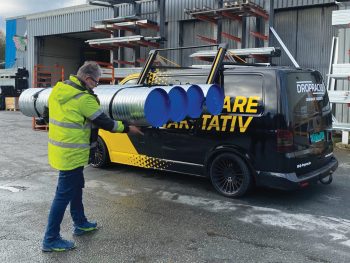Providers of racking, storage systems as well as beacons, graphics and other equipment, have been facing new challenges in addition to the pandemic years. The arrival of electric vans on the market has brought new pressure to reduce the weight of ancillary systems such as racking. Here is what some of the main players in the market are doing to overcome the hurdles…

System Edström
System Edström has introduced products designed in particular for electric vehicles. Van racking suppliers have had to change their products to meet new constraints on space and weight. The module design that System Edström uses gives the company the flexibility to fit its systems to any vehicle, regardless of size or power source.
By using lighter and more sustainable materials, the company has also been able to improve its environmental performance. Its recent Green Report highlighted the progress the company has made in this area.
System Edström has also invested heavily in its UK operation. As part of a redevelopment of its headquarters in Corby, the company has increased its workshop capacity and warehouse space. Commercial director David Sawford said: “This has allowed us to greatly expand the amount of stock we hold on site, so the team can fulfil the many orders we receive quickly and efficiently.”
Bott
The Bott Group manufactures and supplies vehicle racking and conversions as well as workplace systems and workshop equipment. With production facilities across Europe and global importers, Bott has a worldwide service network.
The company offers a full and comprehensive van conversion service, with more than 40 years of industry experience. The company says its aim is to fully understand the needs of all stakeholders, before delivering a compliant, durable and reliable solution for every customer.
Bott provides a full range of tailored services, including van racking, lighting, auxiliary power, communication equipment and vehicle graphics. As a Logistics UK Van Gold Partner, the company supports the drive towards improved operational standards, working with like-minded industry partners. The scheme keeps the company up to date with changes in legislation and best practice guidelines. Bott can then advise its customers accordingly.
Bott has also turned its attention to the effect that electric vehicles and alternative fuels are having on fleet operators. This includes assessing challenges such as payload, range, or the battery draw of planned additional on-board equipment. This enables the company to support its customers with appropriate vehicle choice information and operational handovers. Bott’s team of dedicated aftersales service engineers are on hand should an issue arise.
The Roofbox Company
The Roofbox Company has supplied its Dropracks system for car roof-top fitting for some years. Now, the company, which is based in Cumbria has developed Dropracks XL, designed for medium vans.
The system has been designed to enable loading from ground level. Using a crank handle system, the roof- top racking can be slid out, then wound down from the roof to a height where items can be safely loaded without the need for a ladder. The racking is designed to carry up to 80kg and offers a 1,500mm-long loading platform.
During winding up or down to roof level, the system will automatically lock in place if the winding process is paused, ensuring it can’t be moved in either direction without using the crank handle. Once wound up to roof level, the rack can be easily slid back into place on its frame, where it will be latched securely for transit.
Dropracks XL needs a set of roof bar feet, at extra cost, with a fitting kit as necessary, to attach them to the van roof. Any accessory, such as a pipe carrier, that has T slot fixing bolts will work with the slot that runs along the top of the Dropracks bars. Dropracks is priced at £1,450 and will be available through UK and Irish distributor John Jordan.

